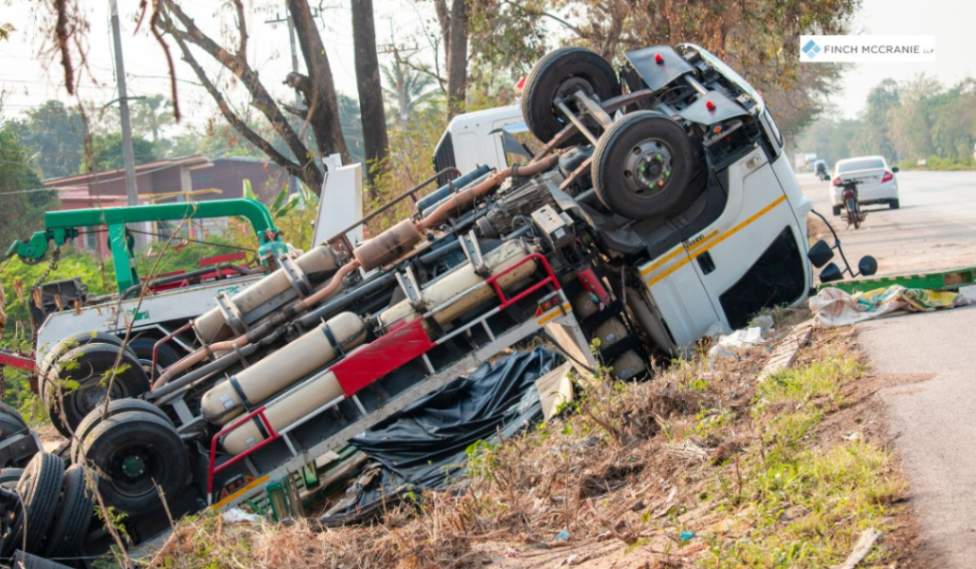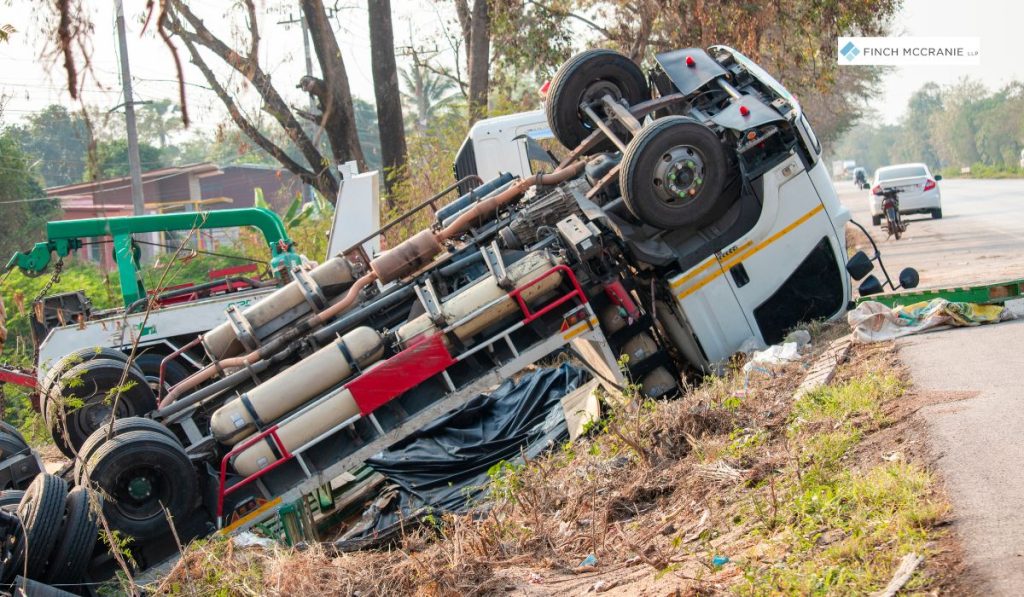Truck accidents can be overwhelming and traumatic experiences, often resulting in significant property damage, severe injuries, and even fatalities.
The aftermath of such an incident is a critical time to ensure your rights are protected.
Here’s a detailed guide on the steps you should take immediately after a truck accident to safeguard your legal and financial interests.
Ensure Safety and Seek Medical Attention
Prioritize Safety: The first and foremost step after any accident is to ensure the safety of all parties involved.
Move to a safe location away from oncoming traffic.
Check for Injuries: Assess yourself and others for injuries.
Even if injuries seem minor, it’s essential to get medical help as some injuries may not be immediately apparent.
Call Emergency Services: Dial 911 to report the accident and request medical assistance. Emergency responders will provide necessary medical care and document the incident.
Report the Accident
Notify Law Enforcement: It’s crucial to have a police report documenting the accident.
The police will gather information, assess the scene, and create an official accident report, which will be essential for insurance claims and potential legal actions.

Gather Information and Evidence
Exchange Information: Collect names, contact information, driver’s license numbers, and insurance details from all drivers involved in the accident.
For truck accidents, be sure to note the trucking company’s name and contact information as well.
Document the Scene: Take comprehensive photos and videos of the accident scene, vehicle damages, skid marks, traffic signs, road conditions, and any visible injuries.
Visual evidence can be invaluable in proving fault and the extent of damages.
Witness Information: If there are any witnesses, obtain their contact details and statements. Witnesses can provide crucial third-party accounts of the accident.
Avoid Admitting Fault
Limit Conversations: When discussing the accident, avoid making statements that could be interpreted as admitting fault.
Be polite, but stick to the facts when speaking to the police and other parties involved.
Notify Your Insurance Company
Prompt Reporting: Contact your insurance company as soon as possible to report the accident. Please provide them with all necessary information and cooperate fully.
Provide Evidence: Share the documentation and evidence you’ve gathered with your insurer to support your claim.
Seek Legal Advice
Consult an Attorney: Truck accidents often involve complex legal issues due to the various parties that may be liable (e.g., truck drivers, trucking companies, manufacturers).
Consulting with a personal injury attorney who specializes in truck accidents can help protect your rights and guide you through the legal process.
Understand Your Rights: An attorney can help you understand your legal rights, potential compensation, and the steps you need to take to pursue a claim.
Follow Up on Medical Treatments
Ongoing Medical Care: Adhere to your doctor’s recommendations and keep all medical appointments.
This not only ensures your health and recovery but also provides a clear record of your injuries and treatments, which is essential for any legal claims.
Keep Records: Maintain detailed records of all medical treatments, medications, therapy sessions, and related expenses.
This documentation is vital for demonstrating the impact of the accident on your health and finances.
Document Financial Losses
Track Expenses: Keep a thorough record of all expenses related to the accident, including medical bills, vehicle repair costs, lost wages, and any other accident-related costs.
Future Costs: Consider potential future expenses related to ongoing medical treatment or loss of earning capacity.
Avoid Quick Settlements
Beware of Early Offers: Insurance companies may offer quick settlements that are often much lower than what you might be entitled to—only sign settlement agreements after consulting your attorney.
Negotiate Fair Compensation: With legal guidance, negotiate for a settlement that adequately covers all your losses, including medical expenses, property damage, lost wages, and pain and suffering.
Stay Organized and Persistent
Organize Documentation: Keep all accident-related documents organized and readily accessible.
This includes police reports, medical records, correspondence with insurance companies, and legal documents.
Stay Informed: Keep yourself informed about the progress of your case and maintain regular communication with your attorney.
Understanding Liability in Truck Accidents
Truck accidents often involve multiple parties, making it crucial to understand who might be liable. Liability can include:
Truck Driver: The driver might be at fault if they were driving recklessly, under the influence, or violating traffic laws.
Trucking Company: The company may be liable if it fails to maintain the truck properly, pressures drivers to meet unrealistic schedules, or neglects to follow safety regulations.
Manufacturers: If a mechanical failure or defect contributed to the accident, the truck or parts manufacturer could be held responsible.
Third Parties: Other entities, such as contractors or loading companies, could be liable if their actions or negligence contributed to the accident.
The Importance of the Police Report
A police report is a critical document in any vehicle accident, especially in truck accidents. Here’s why it’s important:
Official Documentation: The report serves as an official record of the accident, detailing the events as observed by law enforcement.
Insurance Claims: Insurance companies rely heavily on police reports to determine fault and process claims.
Legal Proceedings: Should the case go to court, the police report provides an unbiased account of the accident, which can be pivotal in legal arguments.
Dealing with Insurance Companies
Navigating the claims process with insurance companies can be challenging. Here are some tips:
Be Honest but Cautious: Provide truthful information without admitting fault. Stick to the facts and let the investigation determine liability.
Document Everything: Keep records of all communications with the insurance company, including emails, letters, and phone call summaries.
Don’t Settle Too Quickly: Avoid accepting the first settlement offer, as it may not fully cover your losses.
Consult with your attorney to evaluate any settlement proposals.
Understanding Compensation
Knowing the types of compensation you might be entitled to can help you pursue a fair claim:
Medical Expenses: This includes current and future medical costs related to the accident, such as hospital bills, medications, physical therapy, and rehabilitation.

Lost Wages: If the accident caused you to miss work, you could be compensated for lost income. This also includes future earning capacity if you are unable to return to work or must take a lower-paying job.
Property Damage: This covers the repair or replacement costs of your vehicle and any personal property damaged in the accident.
Pain and Suffering: Compensation for physical pain and emotional distress caused by the accident.
Punitive Damages: In cases of gross negligence or malicious intent, you might be awarded punitive damages intended to punish the wrongdoer and deter similar behavior in the future.
Conclusion
Recovering from a truck accident involves more than just physical healing; it requires a comprehensive approach to protecting your legal rights, securing fair compensation, and addressing emotional well-being.
By following these steps, you can navigate the aftermath with greater confidence and ensure you receive the support and justice you deserve.
If you need professional legal assistance, don’t hesitate to contact us at Finch McCranie LLP to discuss your case and explore your options for recovery and compensation. Our experienced attorneys are here to help you every step of the way.
FAQs
What should I do immediately after a truck accident?
- Ensure safety by moving to a safe location.
- Check for injuries and seek medical attention if needed.
- Call emergency services to report the accident.
Is it necessary to notify the police after a truck accident?
Yes, it’s crucial to have a police report documenting the accident. This report is essential for insurance claims and potential legal actions.
What information should I gather at the accident scene?
- Exchange contact information, driver’s license numbers, and insurance details with all involved parties.
- Take comprehensive photos and videos of the accident scene, damages, road conditions, and injuries.
- Obtain witness information if available.
Should I admit fault at the accident scene?
When speaking to the police and other parties involved, it’s advisable to avoid admitting fault and stick to the facts.
When should I notify my insurance company?
Contact your insurance company as soon as possible after the accident and provide them with all necessary information.
Why is it essential to seek legal advice after a truck accident?
Truck accidents often involve complex legal issues, and consulting with a personal injury attorney specializing in such cases can help protect your rights and guide you through the legal process.
What should I do about ongoing medical treatments?
Adhere to your doctor’s recommendations and keep all medical appointments to ensure proper recovery and maintain a clear record of your injuries and treatments.
How can I document my financial losses after a truck accident?
Keep thorough records of all accident-related expenses, including medical bills, vehicle repair costs, lost wages, and any other related costs.
Should I accept the insurance company’s first settlement offer?
It’s recommended to consult with your attorney before accepting any settlement offer to ensure it adequately covers all your losses.
Who might be liable in a truck accident?
Liability can include the truck driver, trucking company, manufacturers, and other third parties whose actions or negligence contributed to the accident.
Why is the police report important?
The police report serves as an official record of the accident, which is crucial for insurance claims and legal proceedings.
How should I deal with insurance companies during the claims process?
Be honest but cautious, document all communications, and consult with your attorney before accepting any settlement offers.
What types of compensation can I pursue after a truck accident?
Compensation may include medical expenses, lost wages, property damage, pain and suffering, and punitive damages in cases of gross negligence.
 Trial Attorney Blog
Trial Attorney Blog

